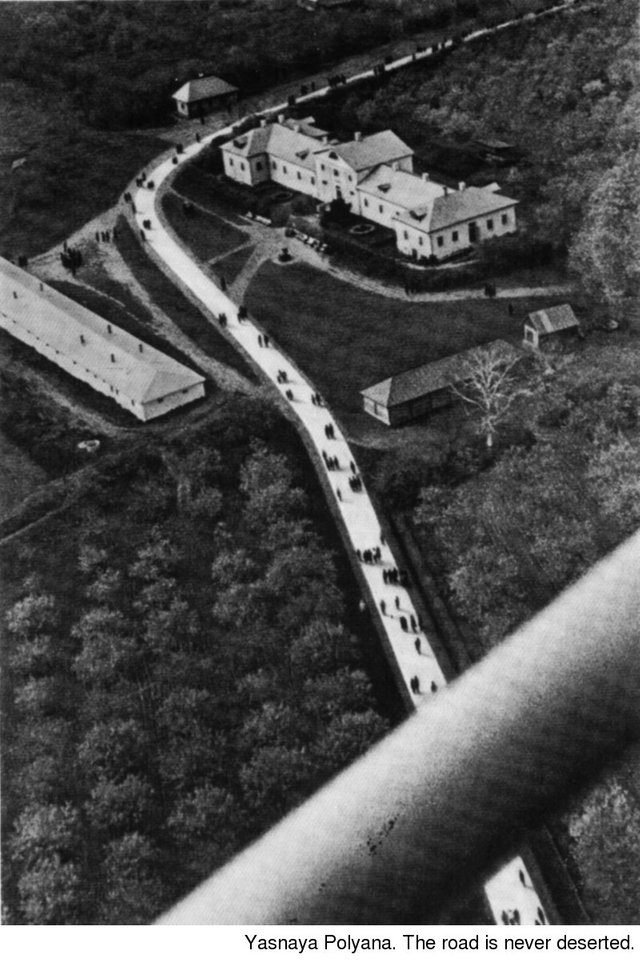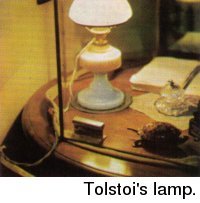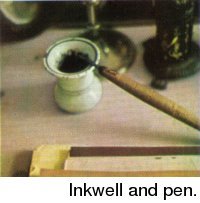Yasnaya Polyana (featuring Vasily Peskov as author)
One can find out how great the area of the Earth is in hectares. Of this number four hundred hectares near the city of Tula are of special interest to people everywhere, for Lev Tolstoi lived here.
Let us have a closer look at the photograph which gives us a bird's-eye view of the estate. We see the road, the buildings, the orchard and the woods that reach off to the horizon. The guidebook to Yasnaya Polyana says that this is exactly how the estate looked sixty years ago when Tolstoi was still living. The house with thatched roof beyond the bend in the road heard the bearded old man knock at the door on the night of October 28, 1910, wake the coachman and drive away from Yasnaya Polyana, never to return. The carriage that bore him away on this last journey has been carefully preserved in the long white building. The large white house on the right is the oldest building on the estate. However, Tolstoi did not live here. This was a combination warehouse and workshop. The Tolstoi family lived in a well-preserved house behind it that is set far among the trees of the park. It is not on the photograph, since it stood some way off from the road. I felt it was more important to get the road leading to the estate, for each year an average of two hundred thousand visitors pass along it to Yasnaya Polyana.


People from ninety-five countries have crossed the threshold of the Tolstoi house. This pilgrimage began in the writer's lifetime. The furnishings, the books and the personal belongings of the great man carry on his conversation with everyone who comes here. There is a bell on an elm tree which was once rung to summon the family. The tree has grown tall and thick around it, and the bell has gradually become a part of the trunk. The face of the old English grandfather clock that resembles Big Ben is of copper plate. A small window in it tells you the date. The clock is two hundred and twenty-five years old. The date in the window was August 28th when the son to be named Lev was born in 1828. The same clock ticked away the hours as impassively when the great man died.

Here are his personal belongings. His pen, an ordinary penpoint in an unpointed wooden holder, lies beside a yellowed stack of plain writing paper. A small armchair, not much bigger than a child's might be, stands beside the desk. It is difficult to imagine that the bearded man looking down at you so intently from the picture on the wall could have sat in it. And we discover that he was not a large man, this veritable giant of a man. The chair is empty. There is not another writer as yet who could by right take his place in it. There is a small table piled with gifts from grateful readers, a table lamp and a portrait of Charles Dickens. The great Russian was an admirer of the great Englishman. There are a pitcher and basin, a plain iron bedstead with brass knobs on the posts, a white coverlet and a worn, long white belted blouse. We have heard and read much of the simple life Tolstoi led, but one is stunned at seeing for himself the simplicity of his surroundings. There are a pair of dumbbells, a yellowed box of medicines, and a riding crop ... He blew out the two candles on his desk fifty-six years ago. They have not been lit since. Tolstoi referred to the small globe to see where a letter had come from. There were so many letters. One, from America, was written on behalf of three thousand Blacks from Indiana. One had to have led a worthy life indeed for Blacks to have appealed to a Russian count for protection.
There are four hundred hectares on the preserve. There is a forest, the small Voronka River flows here, there are ponds, benches,tree-lined avenues,meadows, paths, ash trees and two-hundred-year-old oaks and lindens. One can understand why this is one of the most inspired corners of the earth for it had such a great influence on Lev Tolstoi. Many of his great works were conceived and written here. "This oak tree is described in War and Peace," the guide said. "And this meadow is in... And you recall this avenue of trees, it's also in War and Peace." She continued on in this vein as we walked along the paths of the park and the forest. The harvest of wisdom gleaned here is so great because the man, the writer, lived his years on earth wisely. The hand that held the pen also held a plough, a scythe, an awl, an axe, a gun, an oar and reins. The count had a peasant's rough hands. "I have been mowing hay with the mouzhiks for six days, all day long, and I cannot describe not the pleasure, but the joy I experience while working..."
Tolstoi is unfathomable, and each person finds something for himself in the sage's writings. However, people everywhere and in all times will understand life better and value it more after reading his works. Here is an entry from Tolstoi's diary, made after a walk in the forest at Yasnaya Polyana: "...I went beyond the Reserve this evening and wept from grateful joy-for simply being alive."

He asked to be buried here in the country. Of all the graves of great men his is the simplest: there are some old lindens at the edge of the ravine and a plain mound covered with branches of fir. The tracks of birds, hares and elk can be seen in the fresh snow. And human tracks lead here along a road winding all through the world.
one of my favourite place